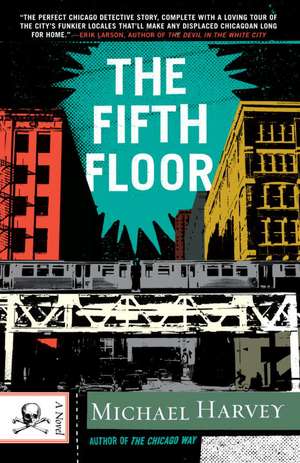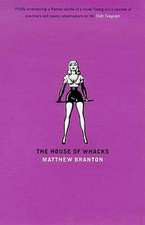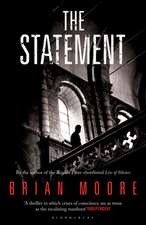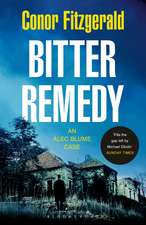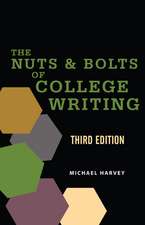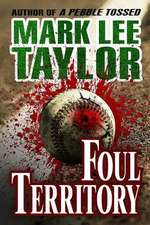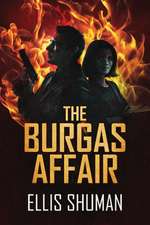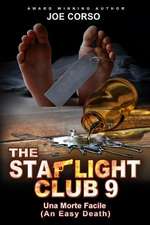The Fifth Floor
Autor Michael Harveyen Limba Engleză Paperback – 30 iun 2009
The trail leads to a dead body in an abandoned house on Chicago's North Side and then to places Kelly would rather not go: specifically, City Hall's fabled fifth floor, where the mayor is feeling the heat. Kelly becomes embroiled in a scam that stretches from current politics back to the night Chicago burned to the ground. Along the way, he finds himself framed for murder, before finally facing a killer bent on rewriting history.
| Toate formatele și edițiile | Preț | Express |
|---|---|---|
| Paperback (2) | 39.31 lei 3-5 săpt. | |
| Bloomsbury Publishing – 15 mai 2011 | 39.31 lei 3-5 săpt. | |
| Vintage Crime/Black Lizard – 30 iun 2009 | 104.66 lei 3-5 săpt. |
Preț: 104.66 lei
Nou
Puncte Express: 157
Preț estimativ în valută:
20.03€ • 21.82$ • 16.88£
20.03€ • 21.82$ • 16.88£
Carte disponibilă
Livrare economică 02-16 aprilie
Preluare comenzi: 021 569.72.76
Specificații
ISBN-13: 9780307386298
ISBN-10: 0307386295
Pagini: 277
Dimensiuni: 134 x 201 x 22 mm
Greutate: 0.3 kg
Editura: Vintage Crime/Black Lizard
ISBN-10: 0307386295
Pagini: 277
Dimensiuni: 134 x 201 x 22 mm
Greutate: 0.3 kg
Editura: Vintage Crime/Black Lizard
Recenzii
“The perfect Chicago detective story, complete with a loving tour of the city's funkier locales that'll make any displaced Chicagoan long for home.” —Erik Larson, author of The Devil in the White City“Michael Harvey is a magnificent new voice.”—John Grisham“Impressive.... A tangled, fascinating tale.”—Chicago Tribune“A nifty retro-noir series.”—The New York Times Book Review“Dazzlingly good.” —ThePlain-Dealer“Another sophisticated caper.... Harvey brilliantly brings all the threads together and provides a satisfying conclusion.” —The Missourian“Harvey’s superb second thriller . . . Harvey’s plot twists in all the right places, and his noir-inspired dialogue crackles without sounding showy. Marlowe and Spade would readily welcome Michael Kelly into their fold.”—Publishers Weekly (starred review)“PI Michael Kelly digs into the history of the Great Chicago Fire for his second case in what’s shaping up as a strong series. . . . Dry wit, delectable clues and tricky leads hallmark this trenchant tale of the Windy City.”—Kirkus Reviews (starred review)Praise for The Chicago Way“The Chicago Way is a wonderful first novel. Michael Harvey has studied the masters and put his own unique touch on the crime novel. This book harkens the arrival of a major new voice.”—Michael Connelly, author of the bestselling Harry Bosch novels“An intricate, fast-paced crime thriller.”—Chicago Sun-Times“A smart, stylish debut. . . . The dialogue is snappy and crisp, and characters pop off the page. The plot flows along swimmingly with plenty of surprises.”—The Boston Globe“A provocative novel that captures the grittiness of the Windy City and spins a murder mystery with a satisfying and out-of-left-field ending. . . . Wonderfully reminiscent of Raymond Chandler.”—USA Today
Notă biografică
Michael Harvey is the creator, writer, and executive producer of the television series Cold Case Files, as well as an Academy Award-nominee for his documentary Eyewitness, and is a former investigative reporter for CBS. He earned a law degree at Duke and a masters in journalism from Northwestern. He also owns a bar in Chicago. He is the author of The Chicago Way.
Extras
CHAPTER 1
I pushed the slim volume of poetry across my desk and into her lap. The woman with auburn hair, perfect posture, and a broken life picked it up.
"I can't read this," she said, and lifted her head.
"That's because it's in Latin," I said. "Why don't you take off the sunglasses?"
"Why don't you translate for me?"
"Take off the glasses."
The woman slid the dark frames up and off her face. Her left eye was brown and watering. Her right was black and swollen shut. The cheekbone below it offered a study in shades of purple, blue, and yellow.
"You get the picture?" she said.
"The poem is by Catullus. First line reads Odi et amo. Translates as I hate and I love."
"And this is my life?"
"People say it's a love poem, but they're wrong. It's about abuse, about not being able to get out, even when the door is wide open and the whole world is yelling that very thing in your ear."
"I can't just leave. It's not that simple."
"It never is. Let me ask you something. How do you think this ends?"
The woman dropped her eyes back to her lap.
"You're a smart woman, Janet. You can figure it out. You wind up hurt real bad. Maybe dead. Or . . ."
She raised her head again. "Or what?"
"Or he winds up dead. Either way, it's not good."
She thinned her lips and set a hard edge at the corners of her mouth. There'd never been anything soft about Janet Woods' face. Beautiful, yes. Even through the bruises. But never soft.
"What do you want?" she said.
"Same thing I wanted three months ago. Get you out of there. Today. Taylor's in school, right?"
She nodded.
"Okay. We pick her up. I take you to a safe place. No one knows but me, you, and your little girl. Then I approach your husband. Explain the situation to him."
"Johnny will never go for it."
"He doesn't decide, Janet. He just listens."
She hesitated, then shook her head. "I can't. Not right now."
I leaned back in my chair and looked toward the front windows. The sun had cracked through my blinds, and dust floated in panels of afternoon light.
"Don't make this personal, Michael."
I swept my gaze back across the room. "Excuse me?"
Janet had brought a cup of Starbucks with her. She took a final sip and dropped the cup into a wastebasket near her feet. Then she crossed her legs and deflated a little with a sigh.
"I said, 'Don't make this personal.'"
"What does that mean?"
She shrugged and stared at the line of her calf, the angle of her shoe.
"I don't know. Just don't."
I breathed lightly through my nose and let the silence between us settle. Old friends make lousy clients. When that friend was once something more, things only get worse. I considered the tangle of history that bound us to each other, but got nowhere with it.
Then I sat forward, tented my fingers on the surface of my desk, and smiled. "How about some lunch?"
Janet closed the book I'd given her and dropped the glasses back over her face. "Sounds good."
"Let's go," I said. "There's a new place down the street."
She unfolded slowly from her chair, moving stiffly for a woman in her thirties. I figured Johnny Woods might be doing a little bodywork as well but didn't comment.
We made our way out of my office and down the corridor. I stopped about halfway down. My client stopped with me. She kept her eyes fastened on her feet as she spoke. "What?"
"Let me at least approach him. Just once. I can run into him by accident."
"What good will that do?"
"Maybe I can get to know him. Talk some sense into him."
Janet put a hand to her temple and rubbed. Her fingers were long and thin. Old, but not with age. Then she dropped her hand back to her side and gave a small shrug.
"He can't know I've hired a private investigator."
"I understand."
She nodded once and we started down the corridor again. It wasn't everything I wanted. In fact, it wasn't even close. But at least it was a start.
CHAPTER 2
I double-parked on Michigan Avenue, popped my blinkers, and cruised the FM dial. I was tapping along to a-ha singing "Take on Me" and wondering whatever happened to my inner Led Zeppelin when Fred Jacobs walked out of the Tribune Building.
Fred was six feet two and weighed slightly less than your average house cat. He was chasing sixty, with an Adam's apple that earned every bit of its moniker and a head of black hair the color and consistency of shoe leather. He wore a brown Ban-Lon golf shirt over a pair of green-and-gold-checked polyester pants with inch-and-a-half cuffs. His socks were white and his loafers black. His skin was yellow when it wasn't just grim, and an unfiltered Camel hung from rubber lips. Fred was a lifelong bachelor. Suffice it to say, he didn't get a lot of chicks. What Fred did get was information. The man shambling along Michigan Avenue had won two Pulitzers and represented probably the best investigative reporter this side of Bob Woodward. I pulled the car up but Fred just kept walking. I'd seen this before and rolled down the window.
"You getting in, Fred?"
He squinted through a layer of cigarette smoke, motioned with one hand, and talked out of the side of his mouth.
"Keep moving. I'll meet you around the corner."
When it came to paranoia, the NSA had nothing on Fred Jacobs. I pulled around the block and waited. It took a minute or two, but he finally slipped alongside my car and got in.
"Just drive straight."
"It's a one-way street, Fred."
"Even better. Get going, for chrissakes."
I popped the car into drive and found my way around the block.
"A lot of people watching you these days, Fred?"
"Fuck off, Kelly. First of all, you're never anything but trouble. Second, you don't work my beat. You don't do what I do. So you don't know anything about what people see and don't see."
Like I said, great reporter. A little touched in the head, but what the hell.
"Where are we going to eat?" he said.
I'd told Fred I'd buy him lunch. He knew that meant I needed information. Of course, Fred expected something in return. Like a story. Maybe another Pulitzer. Probably not. But for someone who weighed no more than the typical calico, Fred Jacobs also liked to eat. Big time.
"I thought we'd go over to Mitchell's," I said.
"We're going to the Goat. Take a left here."
I swung a left off Michigan Avenue and then another at State Street. Jacobs sucked up the last quarter of his cigarette and pushed the butt out an open window. Smoke curled softly from each nostril as the reporter rolled up the window and chuckled to himself.
"Got to hand it to you, Kelly."
"What's that?"
"You stuck it to that TV bitch but good."
He was talking about Diane Lindsay, former Chicago news anchor, convicted killer, and someone I used to sleep with.
"You think so, Fred?"
"Fuck, yes. Talking heads think they invented the news. No respect for journalism. No respect for the process."
"And putting Diane Lindsay in the slam made that right?"
"Didn't make it right. But damn, it was fun to watch. Pull over here."
I dropped into an empty spot on Hubbard Street and the two of us got out. The Billy Goat Tavern is located on the lower level of Michigan Avenue. Most people walk down a set of stairs in front of the Wrigley Building on upper Michigan. Apparently that was a little too public for Jacobs, so we came in from Hubbard.
"The Billy Goat isn't exactly low profile, Fred."
"Not a problem. I eat here eight days a week. Someone like you sits down at my table, what am I supposed to do? So I let you buy me a burger and listen to your bullshit."
"That's the story?"
"That's the story. Come on."
Jacobs opened the heavy metal door, painted red with a black-and-white goat. We walked down a greasy set of steps and into a Chicago legend.
CHAPTER 3
The Billy Goat was more cave than tavern and was everything Royko and Belushi ever made it out to be. Four sets of Greek eyes watched as we walked through the door. Spatulas in hand, they started jabbering about cheeseburgers and chips even before we stepped up to the counter. The menu board was a mildewed version of yellow with black plastic letters, unevenly spaced and mostly misspelled. A cheeseburger cost three bucks. Everyone ordered a double, of course--mostly because it was only a buck extra. Also because that's what the guy behind the counter was making no matter what you ordered. Throw some onions and pickles on your double, then go sit at the elbow of the bar with the white linoleum top. Also known as the Wise Guys' Corner. Watch the regulars drink beer, talk about the mayor, the Bears, the Sox, Chicago. Then, now, forever. Leave the Billy Goat, walk the world for a year or two, and return. They'd still be there. Same guys, or ones just like them. Drinking a Billy Goat draft, light or dark. Rolling out the history of their city. Pushing at the past, pulling it into the present. Arguing and exaggerating. Preserving what's been and making it come to life again. All for the price of a drink and available seven days a week, in the home of the Goat.
"Double cheeseburger, Mr. Jacobs?"
The counterman knew my reporter friend, which wasn't a surprise. Jacobs ordered two double cheeseburgers, which wasn't much of a surprise either.
"Give me a couple bags of chips too," Jacobs said, and lifted a thumb my way. "He's paying."
The counterman winked and waved a spatula at me.
"Double cheese, sir?"
I nodded. We got our burgers, wrapped in wax paper, dressed them up with onions, pickles, and ketchup, and headed to the VIP section, a grouping of cracked brown tables, dimly lit and pushed together in the very back of the place. A little privacy. Apparently enough for Jacobs, anyway.
"What are you drinking?" he said.
I ordered a can of Bud. Jacobs got himself the house special, something called a Horny Goat, and took a furtive look around. Four tourists took pictures of one another at a table near the door. Other than that the place was empty, save for a drunk at the end of the bar who kept reciting the lineup for the 1984 Cubs to himself. Every time he came to Jody Davis, the guy took a hit on his beer, shook his head sadly, and ordered a shot of Old Grand-Dad. The bartender ignored him and the drunk lapsed back into his play-by-play.
"I think we're okay here, Fred."
"What is it you want, Kelly?"
All I knew about Johnny Woods was what I had learned from Janet. He was a control freak who liked to muscle his wife. Never touched his stepdaughter--not yet anyway--just liked to have a few drinks, come home, and punch the little woman around. All that plus one more thing. He worked downtown. On the fifth floor. For the mayor, John J. Wilson.
"Johnny Woods," I said. "What do you know about him?"
Jacobs took a bite of his burger and stirred a swizzle stick through his Horny Goat. One exercise of his Adam's apple and the drink was half gone. Jacobs wiped his lips with a napkin, finished off the rest of one burger, and pulled the second in front of him.
"Johnny Woods, huh?"
The reporter dug one paw into a sack of chips, filled his mouth, and began to crunch.
"He works for the mayor. Fifth Floor."
"I know that, Fred. What's he do there?"
"What the fuck do any of them do? Why you so interested?"
"It's a case, Fred. No news value. At least not yet."
I didn't see how this case could ever make it into the news, but keeping Fred Jacobs on a string was probably a good idea. Besides, I was paying for the Billy Goat feast so why not push it.
"And if it becomes a story?" Fred said.
"You're my first phone call. Now, what does Woods do on the fifth?"
Jacobs nodded, bit into his second burger, and talked with his mouth full.
"If you looked him up on the payroll, he'd be some PR flack. Probably pulling a hundred K a year. Wilson's got half a dozen of 'em stashed there."
"And what does Johnny really do?"
The reporter spread a smile across his face. "He's what we call a fixer."
"A fixer?"
"Yeah, a guy who fixes problems for the Fifth Floor. Makes things go away. And greases the machinery. All at the same time."
Jacobs' cell phone chirped. He held up a hand and flipped the phone open. "Yeah." He listened, grunted a few times, and began to scribble furiously on a napkin.
When he finished with one napkin, Jacobs gestured to me. I pushed a pile more over to his side of the table; the reporter continued to write. I finished my burger, then my beer. Jacobs snapped the cell shut and stood up.
"You want to know what Woods does?"
I nodded.
"Let's go."
Jacobs headed to the door. I followed. A primer, apparently, was in the offing. On how problems got fixed in Chicago.
From the Hardcover edition.
I pushed the slim volume of poetry across my desk and into her lap. The woman with auburn hair, perfect posture, and a broken life picked it up.
"I can't read this," she said, and lifted her head.
"That's because it's in Latin," I said. "Why don't you take off the sunglasses?"
"Why don't you translate for me?"
"Take off the glasses."
The woman slid the dark frames up and off her face. Her left eye was brown and watering. Her right was black and swollen shut. The cheekbone below it offered a study in shades of purple, blue, and yellow.
"You get the picture?" she said.
"The poem is by Catullus. First line reads Odi et amo. Translates as I hate and I love."
"And this is my life?"
"People say it's a love poem, but they're wrong. It's about abuse, about not being able to get out, even when the door is wide open and the whole world is yelling that very thing in your ear."
"I can't just leave. It's not that simple."
"It never is. Let me ask you something. How do you think this ends?"
The woman dropped her eyes back to her lap.
"You're a smart woman, Janet. You can figure it out. You wind up hurt real bad. Maybe dead. Or . . ."
She raised her head again. "Or what?"
"Or he winds up dead. Either way, it's not good."
She thinned her lips and set a hard edge at the corners of her mouth. There'd never been anything soft about Janet Woods' face. Beautiful, yes. Even through the bruises. But never soft.
"What do you want?" she said.
"Same thing I wanted three months ago. Get you out of there. Today. Taylor's in school, right?"
She nodded.
"Okay. We pick her up. I take you to a safe place. No one knows but me, you, and your little girl. Then I approach your husband. Explain the situation to him."
"Johnny will never go for it."
"He doesn't decide, Janet. He just listens."
She hesitated, then shook her head. "I can't. Not right now."
I leaned back in my chair and looked toward the front windows. The sun had cracked through my blinds, and dust floated in panels of afternoon light.
"Don't make this personal, Michael."
I swept my gaze back across the room. "Excuse me?"
Janet had brought a cup of Starbucks with her. She took a final sip and dropped the cup into a wastebasket near her feet. Then she crossed her legs and deflated a little with a sigh.
"I said, 'Don't make this personal.'"
"What does that mean?"
She shrugged and stared at the line of her calf, the angle of her shoe.
"I don't know. Just don't."
I breathed lightly through my nose and let the silence between us settle. Old friends make lousy clients. When that friend was once something more, things only get worse. I considered the tangle of history that bound us to each other, but got nowhere with it.
Then I sat forward, tented my fingers on the surface of my desk, and smiled. "How about some lunch?"
Janet closed the book I'd given her and dropped the glasses back over her face. "Sounds good."
"Let's go," I said. "There's a new place down the street."
She unfolded slowly from her chair, moving stiffly for a woman in her thirties. I figured Johnny Woods might be doing a little bodywork as well but didn't comment.
We made our way out of my office and down the corridor. I stopped about halfway down. My client stopped with me. She kept her eyes fastened on her feet as she spoke. "What?"
"Let me at least approach him. Just once. I can run into him by accident."
"What good will that do?"
"Maybe I can get to know him. Talk some sense into him."
Janet put a hand to her temple and rubbed. Her fingers were long and thin. Old, but not with age. Then she dropped her hand back to her side and gave a small shrug.
"He can't know I've hired a private investigator."
"I understand."
She nodded once and we started down the corridor again. It wasn't everything I wanted. In fact, it wasn't even close. But at least it was a start.
CHAPTER 2
I double-parked on Michigan Avenue, popped my blinkers, and cruised the FM dial. I was tapping along to a-ha singing "Take on Me" and wondering whatever happened to my inner Led Zeppelin when Fred Jacobs walked out of the Tribune Building.
Fred was six feet two and weighed slightly less than your average house cat. He was chasing sixty, with an Adam's apple that earned every bit of its moniker and a head of black hair the color and consistency of shoe leather. He wore a brown Ban-Lon golf shirt over a pair of green-and-gold-checked polyester pants with inch-and-a-half cuffs. His socks were white and his loafers black. His skin was yellow when it wasn't just grim, and an unfiltered Camel hung from rubber lips. Fred was a lifelong bachelor. Suffice it to say, he didn't get a lot of chicks. What Fred did get was information. The man shambling along Michigan Avenue had won two Pulitzers and represented probably the best investigative reporter this side of Bob Woodward. I pulled the car up but Fred just kept walking. I'd seen this before and rolled down the window.
"You getting in, Fred?"
He squinted through a layer of cigarette smoke, motioned with one hand, and talked out of the side of his mouth.
"Keep moving. I'll meet you around the corner."
When it came to paranoia, the NSA had nothing on Fred Jacobs. I pulled around the block and waited. It took a minute or two, but he finally slipped alongside my car and got in.
"Just drive straight."
"It's a one-way street, Fred."
"Even better. Get going, for chrissakes."
I popped the car into drive and found my way around the block.
"A lot of people watching you these days, Fred?"
"Fuck off, Kelly. First of all, you're never anything but trouble. Second, you don't work my beat. You don't do what I do. So you don't know anything about what people see and don't see."
Like I said, great reporter. A little touched in the head, but what the hell.
"Where are we going to eat?" he said.
I'd told Fred I'd buy him lunch. He knew that meant I needed information. Of course, Fred expected something in return. Like a story. Maybe another Pulitzer. Probably not. But for someone who weighed no more than the typical calico, Fred Jacobs also liked to eat. Big time.
"I thought we'd go over to Mitchell's," I said.
"We're going to the Goat. Take a left here."
I swung a left off Michigan Avenue and then another at State Street. Jacobs sucked up the last quarter of his cigarette and pushed the butt out an open window. Smoke curled softly from each nostril as the reporter rolled up the window and chuckled to himself.
"Got to hand it to you, Kelly."
"What's that?"
"You stuck it to that TV bitch but good."
He was talking about Diane Lindsay, former Chicago news anchor, convicted killer, and someone I used to sleep with.
"You think so, Fred?"
"Fuck, yes. Talking heads think they invented the news. No respect for journalism. No respect for the process."
"And putting Diane Lindsay in the slam made that right?"
"Didn't make it right. But damn, it was fun to watch. Pull over here."
I dropped into an empty spot on Hubbard Street and the two of us got out. The Billy Goat Tavern is located on the lower level of Michigan Avenue. Most people walk down a set of stairs in front of the Wrigley Building on upper Michigan. Apparently that was a little too public for Jacobs, so we came in from Hubbard.
"The Billy Goat isn't exactly low profile, Fred."
"Not a problem. I eat here eight days a week. Someone like you sits down at my table, what am I supposed to do? So I let you buy me a burger and listen to your bullshit."
"That's the story?"
"That's the story. Come on."
Jacobs opened the heavy metal door, painted red with a black-and-white goat. We walked down a greasy set of steps and into a Chicago legend.
CHAPTER 3
The Billy Goat was more cave than tavern and was everything Royko and Belushi ever made it out to be. Four sets of Greek eyes watched as we walked through the door. Spatulas in hand, they started jabbering about cheeseburgers and chips even before we stepped up to the counter. The menu board was a mildewed version of yellow with black plastic letters, unevenly spaced and mostly misspelled. A cheeseburger cost three bucks. Everyone ordered a double, of course--mostly because it was only a buck extra. Also because that's what the guy behind the counter was making no matter what you ordered. Throw some onions and pickles on your double, then go sit at the elbow of the bar with the white linoleum top. Also known as the Wise Guys' Corner. Watch the regulars drink beer, talk about the mayor, the Bears, the Sox, Chicago. Then, now, forever. Leave the Billy Goat, walk the world for a year or two, and return. They'd still be there. Same guys, or ones just like them. Drinking a Billy Goat draft, light or dark. Rolling out the history of their city. Pushing at the past, pulling it into the present. Arguing and exaggerating. Preserving what's been and making it come to life again. All for the price of a drink and available seven days a week, in the home of the Goat.
"Double cheeseburger, Mr. Jacobs?"
The counterman knew my reporter friend, which wasn't a surprise. Jacobs ordered two double cheeseburgers, which wasn't much of a surprise either.
"Give me a couple bags of chips too," Jacobs said, and lifted a thumb my way. "He's paying."
The counterman winked and waved a spatula at me.
"Double cheese, sir?"
I nodded. We got our burgers, wrapped in wax paper, dressed them up with onions, pickles, and ketchup, and headed to the VIP section, a grouping of cracked brown tables, dimly lit and pushed together in the very back of the place. A little privacy. Apparently enough for Jacobs, anyway.
"What are you drinking?" he said.
I ordered a can of Bud. Jacobs got himself the house special, something called a Horny Goat, and took a furtive look around. Four tourists took pictures of one another at a table near the door. Other than that the place was empty, save for a drunk at the end of the bar who kept reciting the lineup for the 1984 Cubs to himself. Every time he came to Jody Davis, the guy took a hit on his beer, shook his head sadly, and ordered a shot of Old Grand-Dad. The bartender ignored him and the drunk lapsed back into his play-by-play.
"I think we're okay here, Fred."
"What is it you want, Kelly?"
All I knew about Johnny Woods was what I had learned from Janet. He was a control freak who liked to muscle his wife. Never touched his stepdaughter--not yet anyway--just liked to have a few drinks, come home, and punch the little woman around. All that plus one more thing. He worked downtown. On the fifth floor. For the mayor, John J. Wilson.
"Johnny Woods," I said. "What do you know about him?"
Jacobs took a bite of his burger and stirred a swizzle stick through his Horny Goat. One exercise of his Adam's apple and the drink was half gone. Jacobs wiped his lips with a napkin, finished off the rest of one burger, and pulled the second in front of him.
"Johnny Woods, huh?"
The reporter dug one paw into a sack of chips, filled his mouth, and began to crunch.
"He works for the mayor. Fifth Floor."
"I know that, Fred. What's he do there?"
"What the fuck do any of them do? Why you so interested?"
"It's a case, Fred. No news value. At least not yet."
I didn't see how this case could ever make it into the news, but keeping Fred Jacobs on a string was probably a good idea. Besides, I was paying for the Billy Goat feast so why not push it.
"And if it becomes a story?" Fred said.
"You're my first phone call. Now, what does Woods do on the fifth?"
Jacobs nodded, bit into his second burger, and talked with his mouth full.
"If you looked him up on the payroll, he'd be some PR flack. Probably pulling a hundred K a year. Wilson's got half a dozen of 'em stashed there."
"And what does Johnny really do?"
The reporter spread a smile across his face. "He's what we call a fixer."
"A fixer?"
"Yeah, a guy who fixes problems for the Fifth Floor. Makes things go away. And greases the machinery. All at the same time."
Jacobs' cell phone chirped. He held up a hand and flipped the phone open. "Yeah." He listened, grunted a few times, and began to scribble furiously on a napkin.
When he finished with one napkin, Jacobs gestured to me. I pushed a pile more over to his side of the table; the reporter continued to write. I finished my burger, then my beer. Jacobs snapped the cell shut and stood up.
"You want to know what Woods does?"
I nodded.
"Let's go."
Jacobs headed to the door. I followed. A primer, apparently, was in the offing. On how problems got fixed in Chicago.
From the Hardcover edition.
Descriere
Private detective Michael Kelly returns in a lightning-paced, intricately woven mystery that links a political cover up in contemporary Chicago to the great Chicago Fire of 1871.
Caracteristici
Reissued to coincide with the paperback of The Third Rail
